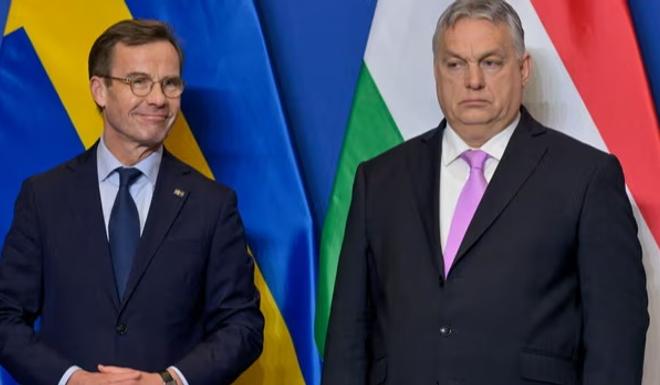Published 12:35 IST, February 26th 2024
Hungary Set To Ratify Sweden’s NATO Accession Today; Here’s All You Need To Know
Stockholm applied for the membership to NATO on May 18, 2022 in wake of Russia’s “special military operation" in Ukraine.

Hungarian Prime Minister, Viktor Orban, is set to ratify the Sweden’s membership bid for the North Atlantic Treaty Organization [NATO] on Monday, February 26 after nearly a 21-month long procrastination and foot dragging. Hungary, deemed a “troublemaker” by Europe for backsliding in its democratic fabric and on rule of law under Prime Minister Viktor Orban, objected to Sweden’s entry without a clear reason other than Swedish criticism of Hungarian democracy.
No substantive objections were tabled by the ruling Fidesz party.
In a historic breakthrough, just a month after Ankara’s legislators endorsed the Scandinavian nation’s accession, lifting the major hurdle on previously non-aligned neutral state, Hungary’s Russia-aligned prime minister has agreed to break the impasse.

'Reconstructing the trust'
Budapest agreed to approve Sweden’s accession protocol after a visit by the Swedish Prime Minister Ulf Kristersson last Friday to Hungary. "A deal on defense and military capacities helps to reconstruct the trust between the two countries,” needed to break the logjam, Hungary’s Orbán said at a joint press conference alongside Swedish counterpart Kristersson.
The two countries inked the bilateral arms deal that earmarked the Sweden’s longstanding policy shift of neutrality. "We do not agree on everything, but we do agree that we should work more actively together when we have a common ground," Kristersson said. "We're both members of EU and, soon, we are both allies in NATO."
Orban, agreeing to his Swedish counterpart, said “We have a mutual trust of cooperation, which is the basis of guaranteeing of each other's security, so that's the reason why it took some time.” He added, "It's not [about Hungary] changing our mind."

Following Russia’s armed invasion of the neighbouring Ukraine and annexation of four Ukrainian oblasts—Donetsk, Kherson, Luhansk and Zaporizhzhia—the two countries Sweden and Finland, that share approximately 1,340 km (830 miles) long border with Russia, decided to abandon their policy of non alignment. Sweden and Finland historically avoided military alliances to remain neutral in times of war.
Stockholm applied for the membership to NATO on May 18, 2022 in wake of Russia’s “special military operation," while the western military bloc signed the accession protocol for Sweden’s entry on July 5, 2022.
“Joining NATO is the best way for Sweden to protect its security. The decision was taken in the light of the fundamentally changed security situation following Russia’s full-scale invasion of Ukraine,” the Swedish government said in a statement, adding that the decision was backed by cross-party working group that argued that the neutrality states have shifted since Moscow’s invasion of Ukraine.
With Hungary’s ratification of Sweden to NATO, the country will become 32nd member expanding the bloc, a precedent Russia’s Putin uses justifying his war in Ukraine—to deter NATO’s expansionist agenda that brings foreign troops to Moscow’s doorstep and threatens national security.

Sweden's ratification withheld over 'grievances'
While Finland’s accession was approved last year, both Turkey and Hungary withheld Sweden’s ratification over grievances that they said were needed to be addressed by Stockholm before they cleared the last obstacle to the Nordic country's bid.
Turkish President Reep Tayyip Erdogan demanded tougher actions from Swedish counterparts towards the crackdown of Kurdish Workers Party PKK, the Kurd militia that Ankara holds accountable for a July coup. Erdogan vouched for more relaxed rules over arms sales, expecting the United States to work on securing the US Congress' endorsement for sale of F-16 fighter jets to replace his own Air Force’s aging fleet.

As Hungary cemented its final hold-out, it was pressurised by the European Union [EU] to fall in line and foster cooperation for alliance’s most signifiant expansion in eastern Europe since 1990s.
Updated 12:35 IST, February 26th 2024


